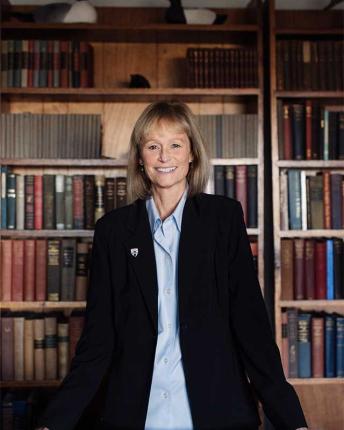At a virtual event on March 3, Yale President Peter Salovey
announced that a $100 million gift from FedEx would help support a new center at Yale focused on developing natural solutions for reducing atmospheric carbon. The
Yale Center for Natural Carbon Capture will accelerate research across academic disciplines, helping to develop a range of solutions to address climate change. YSE Dean Indy Burke spoke at the event and has played an instrumental role in its launch — working closely with FedEx leadership and colleagues across Yale to lay out a vision for the Center. Here she talks about how Yale School of the Environment will be involved in the Center’s work and what opportunities it will bring to YSE faculty, researchers, students, and alumni.
The FedEx funding will be dispersed across Yale schools and departments; at YSE, initial support will create two new professorships, as well as doctoral and postdoctoral fellowships.
I’m also very pleased that the importance of
Environmental Leadership & Training Initiative’s outreach work with on-the-ground practitioners was emphasized and will receive support through this gift. ELTI’s work could be an important link to implementing some of these strategies at scale, and also represents an important principle that we share at YSE, which is that our work should always look to engage and support local communities.
Another point that I think it’s important to emphasize is that FedEx’s generous support will help us advance our work in carbon sequestration and natural climate solutions, but that’s just the first part of the equation. At YSE, we’re also engaged in research in environmental policy, economics, and governance — research that will help pave the way for the global implementation of effective solutions to climate change. Our Environmental Justice and Health initiative, for example, is working to engage and support the communities most vulnerable to climate change because environmental and social and economic issues are intrinsically linked and can’t be solved in a vacuum. The Yale Center for Environmental Communication is studying climate change attitudes and beliefs in the areas most at risk of deforestation, because understanding communication is key to being able develop and implement effective policy. Research in these complementary areas is not under the purview of FedEx’s generous gift, so we will continue to seek out new sources of funding for this vital work.
Q: What are some of the opportunities that the Center could open up to YSE faculty, students, and alumni?
The Center will pursue a wide range of research and strategies related to carbon reduction, so there will be great opportunities for cross-disciplinary work. Avoided deforestation/reforestation will be one aspect of the work, with the Center drawing on expertise from the Forest School and ELTI. But it will pursue a number of strategies for offsetting greenhouse gas emissions, including enhanced weathering, avoided deforestation, and industrial carbon solutions, among others.
In order to fill existing research gaps and avoid overlapping or duplicative efforts, the Center will look to work with partners to identify research that will benefit the entire natural climate solutions community. Our alumni will be a critical resource for us in this endeavor as many of them work in leading NGOs and IGOs. We have already had alumni and supporters reach out with partnership ideas and proposals, and we are eager to pursue them. So, we there will be a lot of new opportunities for collaboration that grow from the Center.
Q: How will FedEx be involved in the research going forward?
The only requirements from FedEx are that the Center conduct applied science and engineering research on carbon solutions, and that we provide an annual update on the Center’s work, which is standard for all of our donors. FedEx’s wish is that we do good work and make a difference, which I have no doubt that we will — and thanks to the expertise and enterprise that we’re able to leverage among our outstanding YSE faculty, students, and alumni, we’re able to start immediately!
 YSE Dean Indy Burke
YSE Dean Indy Burke
 YSE Dean Indy Burke
YSE Dean Indy Burke